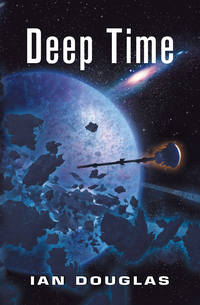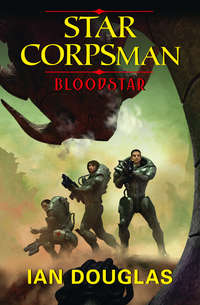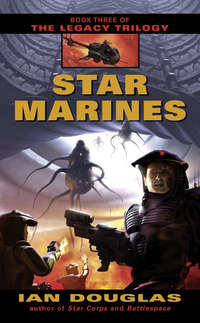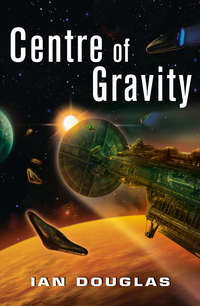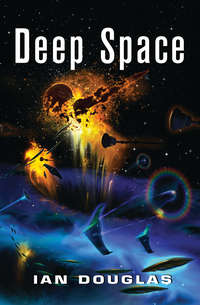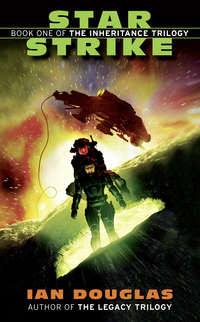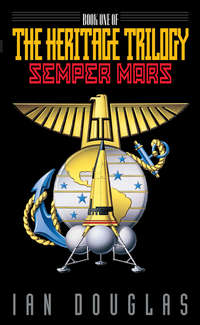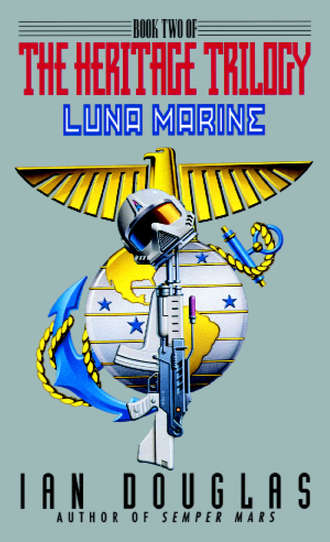
Полная версия
Luna Marine
Squinting against the sunlight, Cheseaux looked for and found a pair of tiny crescents, one silver, one gray, well beyond the horizon of 2034L and bowed away from the sun. Earth was now less than ten million kilometers away, its attendant moon somewhat farther. Both seemed transcendently delicate, ethereal, and small. The war that had wracked the world for the past two years, the burning political questions of Aztlan independence and control of ancient alien technologies all seemed so completely insignificant from this vantage point. It was true, what they said: Looking back at the Earth from space gave one an entirely new perspective, a new outlook.
Perhaps it was Earth’s politicians who should be shipped up here, the lot of them, and not her scientists and soldiers. Let them work out their differences bathed in heavenly radiance, with the Earth nothing more than a frail, silver sliver in the night.
“Well, I think I’ll turn in,” he told the commander. “Let me know if there’s a call from Earth.”
“Of course.”
Laplace was neither large nor luxurious, even as space-craft went. Her hab module and laboratory together were ten meters long and five wide, small enough to have fit easily inside the living and working area of the old Skylab, and she carried twice as many people, three crew and three payload specialists. Cheseaux’s cabin was a closet-sized space in the aft of the hab module with thin plastic walls and a sleeping bag attached to the bulkhead. His “desk” pulled out from one of the walls, a plastic board with Velcro surfaces, to which his laptop was attached.
Pulling the folding panel shut behind him—the only concession to the human need for privacy aboard—he peeled his computer from the desk and wiggled into the sleeping bag so that he didn’t have to think about not floating about. Outside his cabin, the bumps and thumps, the conversations, the smells of ready-heat meals and men in close confinement continued to permeate his world. As much as he’d been enjoying this mission, he was going to be glad to get back to Paris. He’d actually felt, he realized now, a pang of disappointment a few minutes ago when he’d learned Laplace would not be immediately returning home.
He logged onto Spacenet.
Everyone in Laplace’s little crew had his own Net account; the best defense against the feelings of isolation and depression common on long missions in space was the ability to log onto the Net and have immediate access to news, to books or music, to v-mail and e-mail that let the astronauts keep in close touch with people and events back home. As his browser came up, the new-mail icon flashed cheerfully on the menu bar.
Twenty-seven messages, including five requests for real-time v-chats. One from Annette that he’d been looking forward to…the rest from sources as varied as the Académie des Sciences and the Cousteau Foundation, and a British UFO e-mag looking for an interview on ancient aliens. Maybe instant communications through the Net weren’t such an all-encompassing and unalloyed blessing after all.
One e-mail was flagged as confidential and encrypted, from a masked address. He knew immediately who that was from, and it worried him.
He accessed the message. It was in text only, to make the multilevel encryptions it employed simpler…as well as making them less obvious to anyone who might be monitoring e-mail packet transmissions.
The immediate address was a remailing service in Finland; he knew, though, that its author was in the United States. It was hard to decide who would get into more trouble if this correspondence was ever discovered—David Alexander for writing it, or Cheseaux for reading it and not reporting it at once to UN officials.
Not that he would even consider reporting it. David was a good friend, had been a friend and close correspondent ever since the two of them had met at a symposium on the Cydonian ruins held in Athens in 2037. It had been one of those relationships that sparks from the first meeting, as though they’d known one another for years, a reflection of what the Latinos called simpatico.
His screen went dark as the encryption software began chewing through columns of numbers and letters. There were several such software packages available, none guaranteed a hundred percent secure…but the sheer volume of encoded messages routing their way through the Spacenet nowadays meant their correspondence was probably safe, even though such traffic was actively discouraged by both sides in the war.
The words decryption complete appeared, followed a moment later by the complete text of the message.
JEAN-ETIENNE:
THEY’RE SENDING ME TO THE MOON TO INVESTIGATE ARTIFACTS YOUR PEOPLE FOUND THERE. I GATHER OUR MUTUAL FRIEND MARC BILLAUD IS THERE ALREADY. WHAT GIVES WITH THE INCREDIBLE SECRECY SURROUNDING THIS THING? THEY TELL ME THAT MARC FOUND AN ET SHIP, WHICH IS FANTASTIC NEWS, IF TRUE. IT MIGHT EVEN BE THE SORT OF THING THAT WOULD GET OUR GOVERNMENTS TO BURY THE HATCHET AND DECLARE PEACE.
IT SOUNDS LIKE YOUR PEOPLE ARE OUT AND MINE CONTROL THE SITE NOW. IS THERE SOMETHING I SHOULD KNOW GOING IN? DO YOU HAVE ACCESS TO ANY OF MARC’S REPORTS ON THE SITE, THERE IN PARIS, OR DO YOU KNOW ANYTHING ABOUT HIS FINDS THAT WOULD BE USEFUL ON THIS END? I’LL PASS ON WHAT I CAN LEARN AS I GET THE CHANCE.
CORDIALLY,
DAVID A.
Cheseaux smiled. A charming letter, and so utterly naive…but then, the Americans were a naive people. As much as he liked, admired, and respected young Alexander, he was not about to give the American military secrets. There was a war on, after all! And as for ending hostilities—he assumed that that was the meaning of the enigmatic phrase “bury the hatchet”—he surely didn’t think that the UN Authority was about to surrender its claim to the wreckage discovered recently at Picard, did he?
Except…
Cheseaux sighed. How much of what David wanted was classified for honest reasons of legitimate state security, and how much was due to the shortsighted scrabblings of small-minded and paranoid UN bureaucrats?
Just what was it that had divided the world for these past two years, anyway? The United States refusal to hold a UN-mandated plebiscite on the question of independence for some of its Southwestern states. Cheseaux snorted. He scarcely blamed Washington for refusing that one, especially since the vote was to be limited to the American states involved and would have included the populations of Mexico’s northwestern states—a stacked deck if ever there’d been one. That wasn’t even worth a decent riot or two, to say nothing of the war!
What else? Russia’s refusal to back down to China’s demands for parts of Siberia; those land claims went way back and could have been settled in other ways. The fear that the United States and Russia were using their superiority in spaceflight technology to grab the newly discovered archeological discoveries and exotechnologies for themselves. The willingness of the United States to actually publish some of those discoveries prematurely, without weighing the impact they would have on religious, political, and social systems worldwide.
Конец ознакомительного фрагмента.
Текст предоставлен ООО «ЛитРес».
Прочитайте эту книгу целиком, купив полную легальную версию на ЛитРес.
Безопасно оплатить книгу можно банковской картой Visa, MasterCard, Maestro, со счета мобильного телефона, с платежного терминала, в салоне МТС или Связной, через PayPal, WebMoney, Яндекс.Деньги, QIWI Кошелек, бонусными картами или другим удобным Вам способом.


